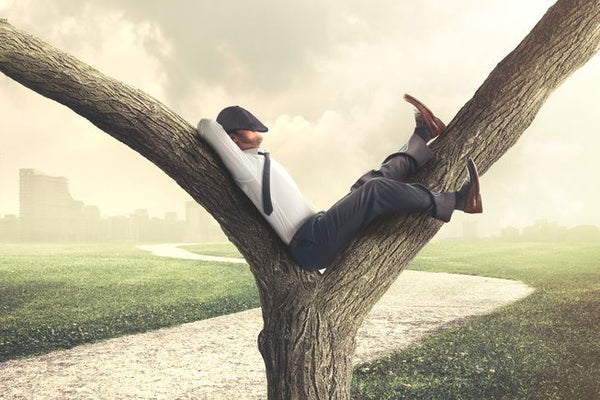A very long time ago, someone without any friends, who people crossed the street to avoid and probably worked himself to death said, "The devil makes work for idle hands to do."
And, unfortunately, for many of us, those words stuck. And so sloth became a deadly sin. If we can't be busy all the time, at least, let's make it appear that way so the devil doesn't get any ideas.
Here's how writer Rachelle Williams describes it for the Chopra Center:
"Society has shifted toward prioritizing hyper-productivity, making the notion of doing nothing seem unproductive and inefficient. If there is time left unfilled during the day, there is an urge to fill it with something. It's no wonder people have such a hard time relaxing and enjoying moments of nothingness."
But then there's the Italian philosophy of dolce far niente. It literally means the sweetness of doing nothing. It was most famously articulated by a man sitting, appropriately enough, at an Italian barbershop in the movie "Eat, Pray Love."
From barbershop chairs to font porches to public terrazas, Italians have been living la dolce far niente for centuries. And so far, the devil hasn't shown up.
And no, that doesn't mean doing nothing at all. That's nearly impossible — and even the attempt would be far more work than most of us would prefer to do.
Rather, the philosophy embraces easy moments: Take the dog for a slow walk. Let her lead the way. Find a nice perch — a park bench or a patio — and look at all the people passing by.
They look so busy. Probably reciting that crusty old manta about "idle hands" in their addled brains.
Let the tea take its time to steep. Chat with a stranger. Or just go back to bed.
This is the vacation we need every day.
If you're one of those people who need structure, even in leisure, there are precious few guidelines on getting started.
For one thing — and in a society that starts staring at screens early in life, this might seem like work at first — unplugging is essential. Banish the beeps, buzzes and all the pretty lights of your online self. No Facebook. No news sites. No reading this … unless it's on a printed page.
Another thing? Don't fret the time you spend out of the matrix.
"All the noise — the Facebook, the reality TV, the latest and greatest no-one-can-get-in-there-without-calling-a-month-ahead restaurant — it all fades away when we can just do nothing," writes psychologist and author Colleen Long in Psychology Today.

With screens off, chores skipped and worries about tomorrow gone, you might be surprised by all that extra space in the day — and how naturally nothing activities ooze in to fill those gaps.
"What if instead of saving up seven vacation days out of 365 to finally enjoy life, you spread those out in hours among each day?" Long asks. "What if you didn't look at Saturday/Sunday as your only day to cut loose and chill out?
"Maybe you sit and read a book. Maybe you stare out the window or balcony and listen to your favorite musician. Maybe you learn how to whistle … What can you do today to begin doing nothing?"
Those are big, important questions worth pondering. If only you were in a pondering mood. But let's embrace la dolce far niente — and take a nap instead.
Author: CHRISTIAN COTRONEO


